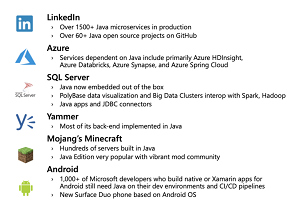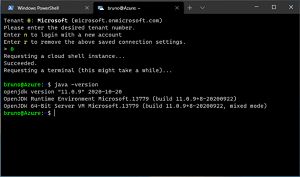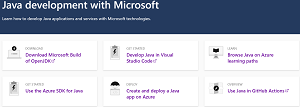News
Microsoft's Open Source OpenJDK for Java Goes GA
The Microsoft Build of OpenJDK, an open source kit for Java featuring "backported fixes and enhancements we deem important to our customers and our internal users," has reached general availability.
Announced during the Microsoft Build 2021 developer conference, it comes with binaries for Java 11, based on OpenJDK 11.0.11+9 for x64 server/desktop implementations on macOS, Linux and Windows, the company said. Because the company is such a heavy user of Java -- "We use more Java than one can imagine" -- it decided to collaborate with and contribute to the popular programming language's ecosystem. The heavy use of Java occurs mostly in the Azure space and was exemplified by the establishment of the Java Engineering Group in its Developer Division in 2019, and the acquisition of jClarity to optimize Java workloads in Azure. Along with the cloud platform, Java helps power the company's LinkedIn site and its Minecraft game.
 [Click on image for larger view.] Java at Microsoft (source: Microsoft).
[Click on image for larger view.] Java at Microsoft (source: Microsoft).
Because Java 11 is a little long in the tooth now -- being released in September 2018 -- the company also is publishing a new Early Access binary for Java 16 for Linux and Windows on ARM, based on the latest OpenJDK 16.0.1+9 release. Java 16 went GA in March.
 [Click on image for larger, animated GIF view.] Microsoft Build of OpenJDK on Azure Cloud Shell in Animated Action (source: Microsoft).
[Click on image for larger, animated GIF view.] Microsoft Build of OpenJDK on Azure Cloud Shell in Animated Action (source: Microsoft).
"This new Java 16 release is already in use by millions of Minecraft players, with the latest Minecraft Java Edition Snapshot version 21W19A, which has been updated to bundle a Java 16 runtime based on the Microsoft Build of OpenJDK," Microsoft said.
Along with the GA release, the company also shipped Microsoft Build of OpenJDK Docker images, along with associated Dockerfiles, designed for use in any Java applications or components that can be deployed anywhere, including the Azure cloud.
"Microsoft Build of OpenJDK binaries may contain fixes and enhancements or backported fixes and backported enhancements that we deem important to our customers and our internal users but that have not been (and may not be) incorporated in the upstream OpenJDK project due to decisions outside of Microsoft’s control," the company said. "Fixes and enhancements that have not yet been formally upstreamed will be clearly signposted in our release notes with source code available."
 [Click on image for larger view.] New Java Hub
[Click on image for larger view.] New Java Hub
Along the with the tech bits, the company also announced a new documentation hub for Java development with Microsoft, designed to coalesce resources to help use Java with Microsoft technologies.
About the Author
David Ramel is an editor and writer at Converge 360.